-
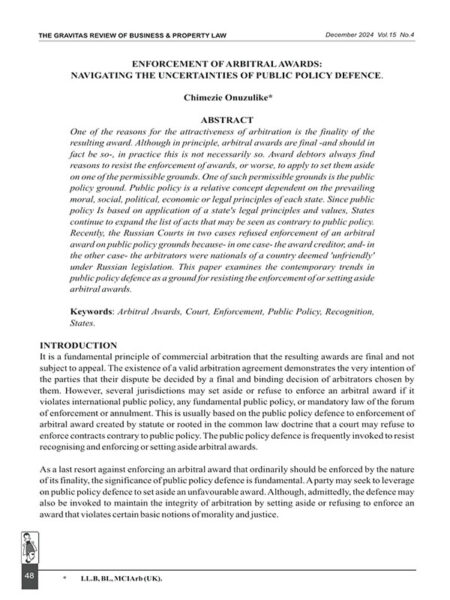
Enforcement of Arbitral Awards: Navigating the Uncertainties of Public Policy Defence
0₦2,500.00Chimezie Onuzulike in his article, Enforcement of Arbitral Awards: Navigating the Uncertainties of Public Policy Defence, examines the contemporary trends in public policy defence as a ground for resisting the enforcement of or setting aside arbitral awards. One of the reasons for the attractiveness of arbitration is the finality of the resulting award. Although in principle, arbitral awards are final -and should in fact be so-, in practice this is not necessarily so. Award debtors always find reasons to resist the enforcement of awards, or worse, to apply to set them aside on one of the permissible grounds. One of such permissible grounds is the public policy ground. Public policy is a relative concept dependent on the prevailing moral, social, political, economic or legal principles of each state. Since public policy Is based on application of a state’s legal principles and values, States continue to expand the list of acts that may be seen as contrary to public policy. Recently, the Russian Courts in two cases refused enforcement of an arbitral award on public policy grounds because- in one case- the award creditor, and- in the other case- the arbitrators were nationals of a country deemed ‘unfriendly’ under Russian legislation.
-
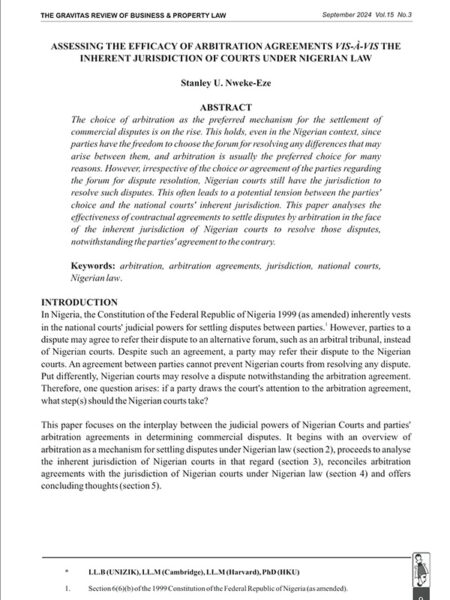
Situating the Efficacy of Arbitration Agreements Vis-à-Vis the Inherent Jurisdiction of National Courts under Nigerian Law
0₦2,500.00Stanley Nweke-Eze, in his article Situating the Efficacy of Arbitration Agreements Vis-à-Vis the Inherent Jurisdiction of National Courts under Nigerian Law, examines the efficacy of Arbitration agreements in the settlement of commercial disputes and the jurisdiction of national courts. The choice of arbitration as the preferred mechanism for the settlement of commercial disputes is on the rise. This holds true, even in the Nigerian context, since parties have the freedom to choose the forum for resolving any differences that may arise between them, and arbitration is usually the preferred choice for a myriad of reasons. However, irrespective of the choice or agreement of the parties regarding the forum for dispute resolution, a party may still invoke the inherent jurisdiction of the Nigerian courts to resolve such disputes. Oftentimes, this leads to a potential tension between the choice of the parties and the inherent jurisdiction of the national courts. Nweke-Eze analyses the effectiveness of contractual agreements to settle disputes by arbitration in the face of the inherent jurisdiction of Nigerian courts to resolve those disputes, notwithstanding the parties’ agreement to the contrary.
-
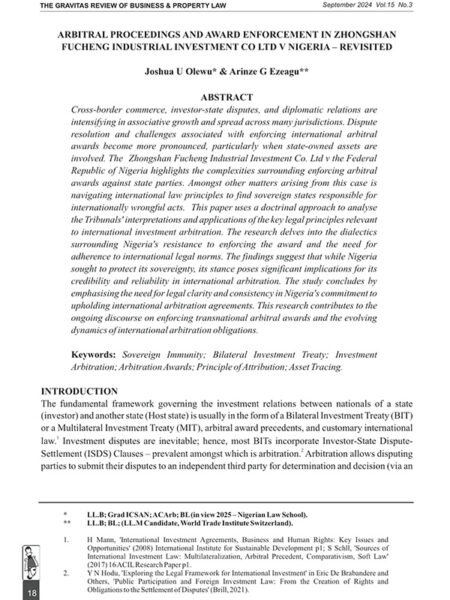
Arbitral Proceedings and Award Enforcement in Zhongshan Fucheng Industrial Investment Co Ltd v Nigeria – Revisited
0₦2,500.00Joshua Olewu and Arinze Ezeagu in their article, Arbitral Proceedings and Award Enforcement in Zhongshan Fucheng Industrial Investment Co Ltd v Nigeria – Revisited, examine jurisdictional issues arising from the enforcement of arbitral award in the celebrated case of Zhongshan Fucheng Industiral investment Co. Ltd v FRN. Cross-border commerce, investor-state disputes, and diplomatic relations are intensifying in associative growth and spread across many jurisdictions. Dispute resolution and challenges associated with enforcing international arbitral awards become more pronounced particularly when state-owned assets are involved. The case of Zhongshan Fucheng Industrial Investment Co. Ltd v Federal Republic of Nigeria highlights the complexities surrounding the enforcement of arbitral awards against state-parties. Amongst other matters arising from this case, is the navigation of international law principles to find sovereign states responsible for internationally wrongful acts. Using a doctrinal approach, Olewu and Ezeagu analyze the Tribunals’ interpretations and applications of the key legal principles relevant to international investment arbitration. The research delves into the dialectics surrounding Nigeria’s resistance to the enforcement of the award and the need for adherence to international legal norms. The findings suggest that while Nigeria sought to protect its sovereignty, its stance poses significant implications for its credibility and reliability in international arbitration. The study concludes by emphasizing the need for legal clarity and consistency in Nigeria’s commitment to upholding international arbitration agreements. This research contributes to the ongoing discourse on the enforcement of transnational arbitral awards and the evolving dynamics of international arbitration obligations.
-
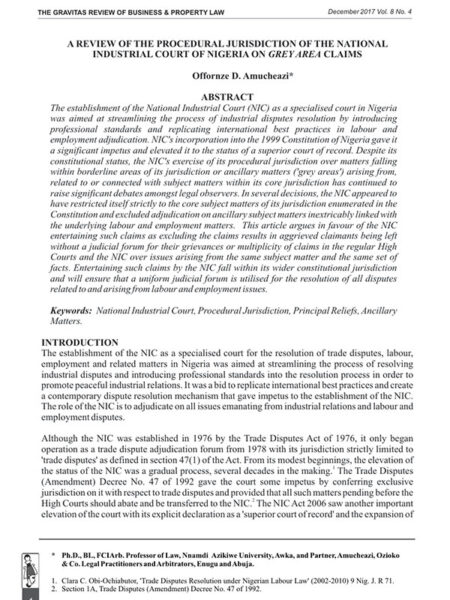
A Review of the Procedural Jurisdiction of the National Industrial Court of Nigeria on Grey Area Claims
0₦2,500.00Professor Offornze Amucheazi of Nnamdi Azikiwe University, Awka, and Partner, Amucheazi, Ozioko & Co, in his article, “A Review of the Procedural Jurisdiction of the National Industrial Court of Nigeria on Grey Area Claims”, examines the National Industrial Court’s exercise of jurisdiction over ancillary matters ‘arising from, related to or connected with’ subject matters within its core jurisdiction. He argues that despite being empowered in that regard, the NIC, from a review of several cases, appears to have restricted itself strictly to the core subject matters of its jurisdiction enumerated in the Constitution, and excluded adjudication on ancillary subject matters inextricably linked with the underlying labour and employment matters. He concludes that this cautious approach may leave aggrieved claimants without a judicial forum for their grievances, or lead to multiplicity of claims in different courts over issues arising from the same subject matter and the same set of facts.
-
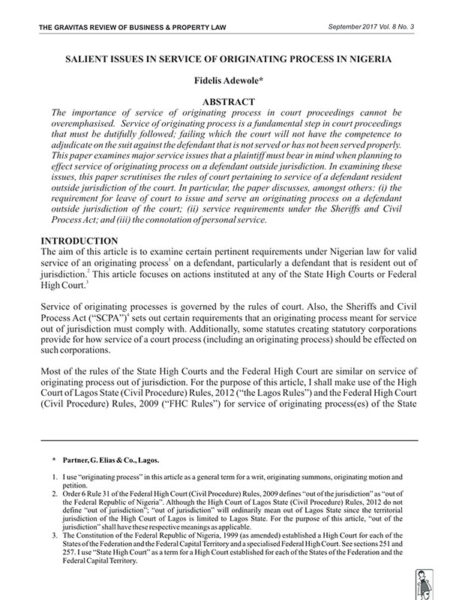
Salient Issues in Service of Originating Process in Nigeria
0₦2,500.00Fidelis Oyewole, Partner, G. Elias & Co in his article, “Salient Issues in Service of Originating Process in Nigeria” explores the world of service of originating processes with a compendium of rules and rulings, to help the practitioner navigate the somewhat arcane terrain of service. In particular, he scrutinises the rules of court pertaining to service of a defendant resident outside jurisdiction, the requirement for leave of court to issue and serve a defendant outside jurisdiction, service requirements under the Sheriffs and Civil Process Act, and the connotation of personal service.
-
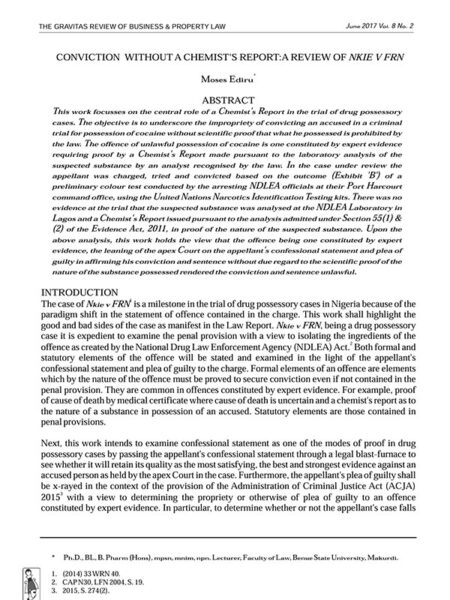
Conviction without a Chemist’s Report: A Review of Nkie v FRN
0₦2,500.00Dr Moses Ediru, of the Faculty of Law, Benue State University in his article “Conviction Without a Chemist’s Report: A Review of Nkie v FRN“, argues that in the trial of drug possessory cases, where the offence is one constituted by expert evidence, presentation of a Chemist’s Report is imperative. In the case under review, the appellant was charged, tried and convicted based on the outcome of a preliminary colour test conducted by the arresting NDLEA officials using the United Nations Narcotics Identification Testing kits. The suspected substance was not analysed at the NDLEA Laboratory and a Chemist’s Report issued pursuant to the analysis, in proof of the nature of the suspected substance. The article argues that the offence being one constituted by expert evidence according to the National Drug Law Enforcement Agency Act, the leaning of the Supreme Court on the appellant’s confessional statement and plea of guilty in affirming his conviction and sentence without due regard to the scientific proof of the nature of the substance possessed rendered the conviction and sentence unlawful.
-
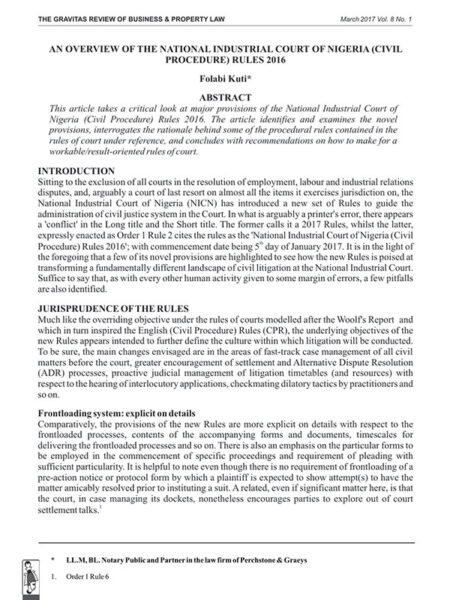
An Overview of the National Industrial Court (Civil Procedure) Rules 2016
0₦2,500.00Folabi Kuti, Partner, Perchstone & Graeys gives “An Overview of The National Industrial Court of Nigeria (Civil Procedure) Rules 2016” in his beautifully written article. He x-rays the salient and revolutionary provisions of the new Rules, the confusion between the short and long titles, and the applicability of ratified but undomesticated treaties by the National Industrial Court.
-
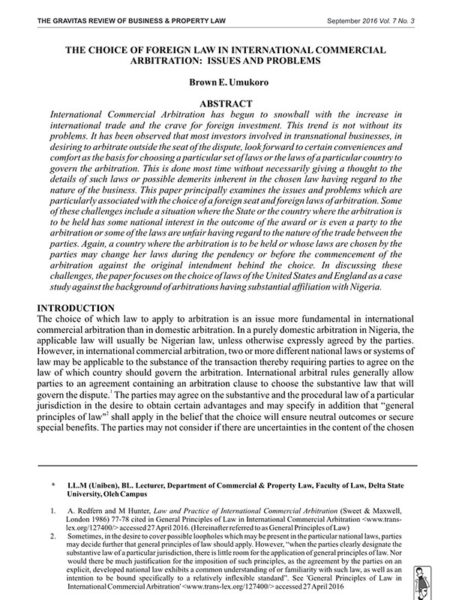
The Choice of Foreign Law in International Commercial Arbitration: Issues and Problems
0₦2,500.00Brown Umukoro, Lecturer, Faculty of Law, Delta State University, Oleh in his article “The Choice of Foreign Law in International Commercial Arbitration: Issues and Problems” examines how the expected outcome or intended benefit of a choice of foreign law in international commercial arbitration may be frustrated by several factors including law and public policy of the foreign country and change in laws during the pendency of arbitration. He concludes that the Decolonisation and Law of the Seat theories do not adequately address the concern of investors and advocates a comprehensive code of rules for the resolution of conflict between the lex arbitri and other systems of law.
-
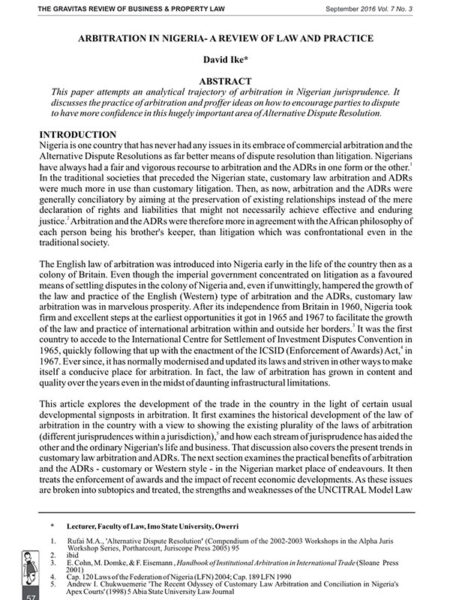
Arbitration in Nigeria – A Review of Law and Practice
0₦2,500.00David Ike, Lecturer, Faculty of Law, Imo State University, Owerri in his article “Arbitration in Nigeria-A Review of Law and Practice” gives an overview of the development of arbitration and its practice in Nigeria. He discusses current issues in arbitration including the constitutionality of section 34 of the Arbitration and Conciliation Act, pre-emptive court proceedings, recognition and enforcement of arbitral awards, and arbitrators’ fees.
-
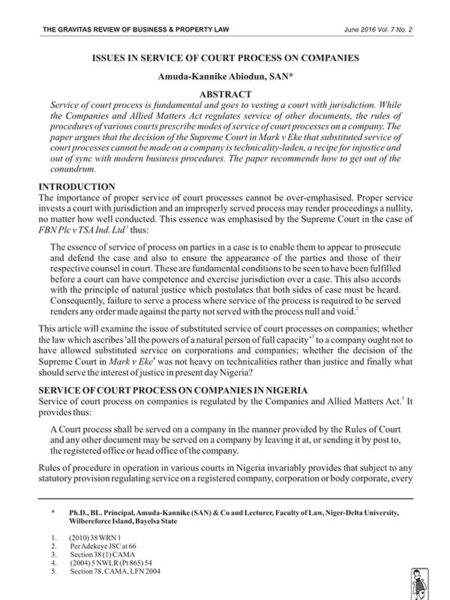
Issues in Service of Court Process on Companies
0₦2,500.00Dr Abiodun Amuda-Kannike SAN, Principal, Amuda-Kannike (SAN) & Co and Lecturer, Faculty of Law, Niger-Delta University, Wilberforce Island in his article, “Issues in Service of Court Process on Companies” examines the provision of the Companies and Allied Matters Act and various Rules of Court on service of court processes on companies. He bemoans the decision of the Supreme Court in Mark v Eke, that substituted service of court processes cannot be made on a company, as technicality-laden, a recipe for injustice and out of sync with modern business process.
-
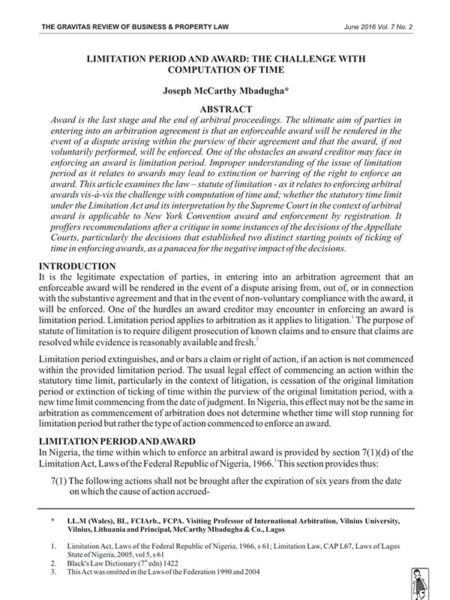
Limitation Period and Award: The Challenge with Computation of Time
0₦2,500.00Joseph Mbadugha, SAN, Visiting Professor of International Arbitration, Vilnius University, Lithuania and Principal, McCarthy Mbadugha & Co confronts a daunting issue in “Limitation Period and Award: The Challenge with Computation of Time.” He argues that as the courts have been strict in holding that, in enforcement of arbitral award, limitation period runs from the date of accrual of the original cause of action in the arbitration agreement and not from the date of the arbitral award, there could be two ways of enforcing an arbitral award with two distinct ticking clocks: enforcement of an award as a judgment of the court and enforcement as a breach of implied promise to perform a valid award. In the former, time begins to run from the date of accrual of the original cause of action that gave rise to the arbitration, while in the latter, time runs from the date the award debtor refused to perform the award.
-
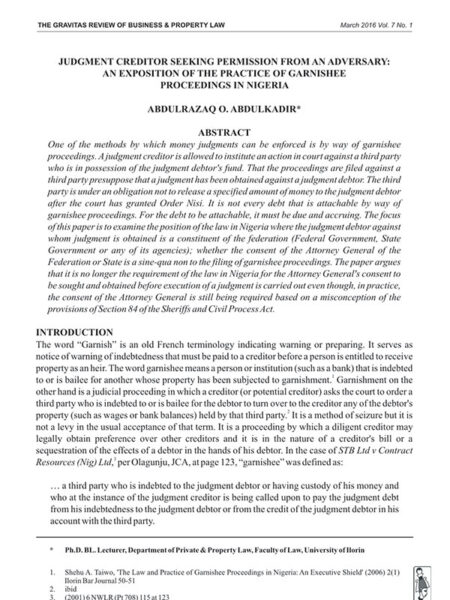
Judgement Creditor Seeking Permission from an Adversary: An Exposition of the Practice of Garnishee Proceedings in Nigeria
0₦2,500.00Dr Abdulrazaq Abdulkadir of the Department of Private & Property Law, University of Ilorin in his article “Judgment Creditor Seeking Permission from an Adversary: An Exposition of the Practice of Garnishee Proceedings in Nigeria” examines the practice of courts requiring judgment creditors seeking to file garnishee proceedings against the government to seek the consent of the Attorney General. He argues that the practice is against the provision of the 1999 Constitution and may be a result of a misconception of the implications of Section 84 of the Sheriffs and Civil Process Act.
The Gravitas Review of Business & Property Law



